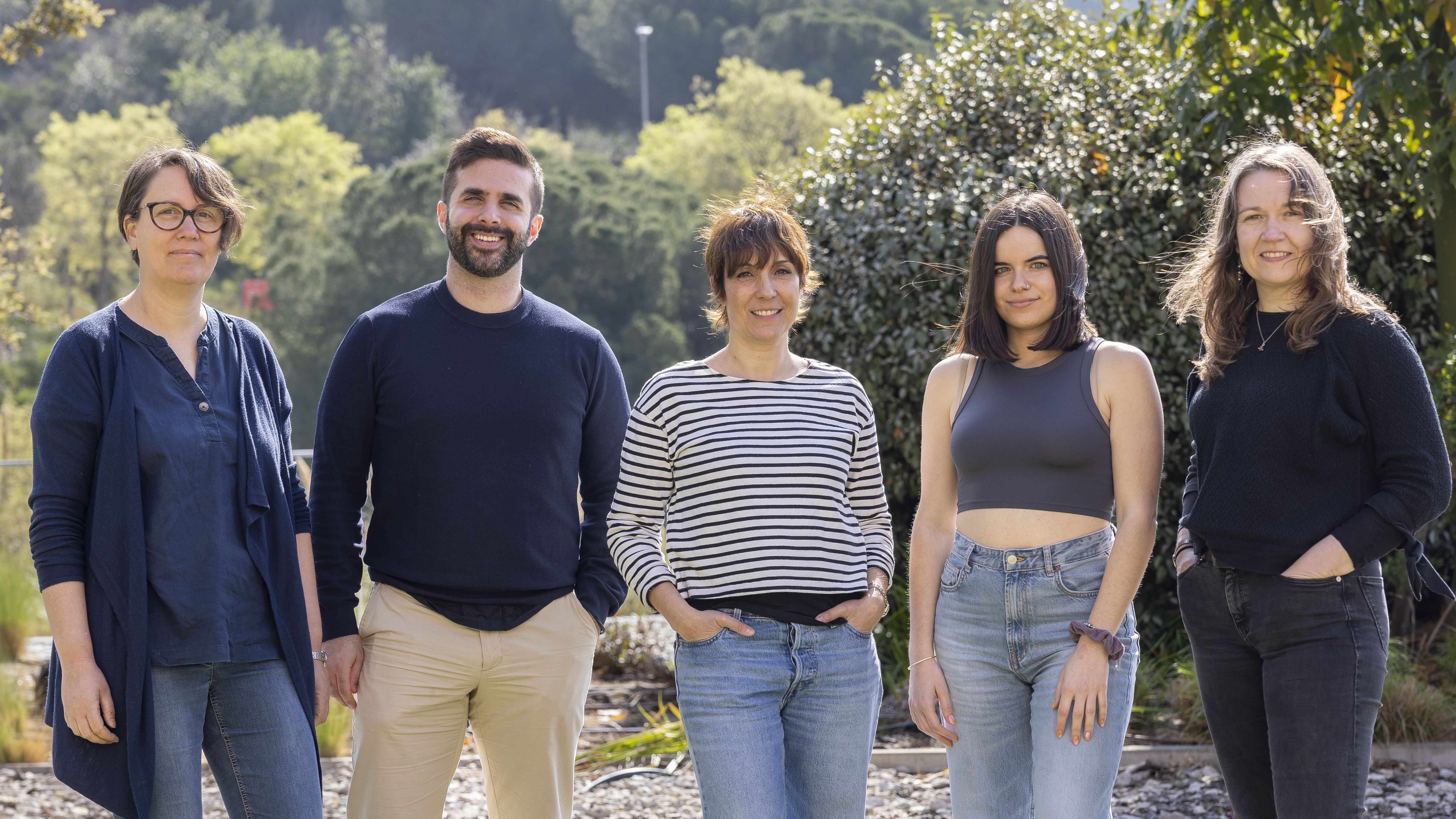About
Colorectal cancer stands as the most prevalent form of cancer and ranks as the second leading cause of cancer-related fatalities in Spain. Current treatment protocols for patients with metastatic disease predominantly involve a combination of chemotherapy and targeted therapies. The primary aims of these treatments are twofold: firstly, to diminish tumour burden, facilitating surgical intervention and thereby significantly enhancing survival rates; and secondly, to alleviate symptoms and extend patients' lifespans to the fullest extent possible.
Despite the ground-breaking advancements in immunotherapy within the field of oncology, its efficacy remains limited, benefiting less than 5% of colorectal cancer cases. A significant obstacle in achieving clinicians' treatment objectives lies in the emergence of treatment resistance, which eventually affects nearly all patients.
This research group is dedicated to unravelling the mechanisms behind the development of resistance to conventional treatments in colorectal tumours. Its objectives encompass identifying predictive markers of treatment response and uncovering tumour vulnerabilities that can inform the utilization of alternative existing treatments or the development of novel therapeutic approaches. Furthermore, the group endeavours to elucidate the factors contributing to the ineffectiveness of immunotherapy in colorectal cancer and explore strategies to reverse this trend.
The team employ a multifaceted approach, utilising both preclinical models and patient samples. Their overarching goal is the development of personalised medicine tools that not only enhance patient survival but also improve their quality of life.
Their research is done in the framework of two institutional programs: the ProCURE program, at the Catalan Institute of Oncology and the CARE program, at IGTP.
Keywords: Colorectal cancer, biomarkers, chemotherapy, immunotherapy, therapeutic resistance.

Group leader
- Eva Martínez-Balibrea

Eva Martínez-Balibrea
Dr Martinez-Balibrea is a biologist with a strong research background in colorectal cancer (CRC), who has dedicated her career to discovering clues for better clinical management of CRC patients through a translational research perspective. During her PhD, she studied how genetic variants predicted response to treatment in CRC patients. Notably, her results led her to co-lead a clinical trial in which CRC patients were randomly assigned first-line treatments based on specific genetic polymorphisms. This study, which was the first of its kind, was published in the top oncology journal, Annals of Oncology, in 2018.
Her current research focuses on studying chemokines as prognostic and/or predictive factors, finding new biomarkers and drug targets through the study of chromatin regulation, implementing the dTAG system to degrade proteins as a possible therapy tool, and implementing ex vivo therapy profiling using organotypic tumour spheroids as a preclinical tool to test immunotherapies and other therapies.
Martinez-Balibrea has authored or co-authored 39 publications in high-impact journals and has been awarded several projects as a PI. She is the Secretary of the Internal Scientific Committee at Germans Trias i Pujol Research Institute (IGTP) and of EORTC’s Pathobiology Group (PBG), which aims to find cancer biomarkers and translate their application to clinical practice.
Contact: embalibrea(ELIMINAR)@iconcologia.net
ORCID: 0000-0002-4501-7100
Linkedin profile
Team
Research associate
Cristina Queralt Herrero, PhD(ELIMINAR)
Medical oncologist
Núria Mulet, MD, PhD(ELIMINAR)
Project manager
Melanie Giorgi(ELIMINAR)
PhD students
Ferran Grau Leal(ELIMINAR)
Marta Domenech Viñolas(ELIMINAR)
Technician
Carla Vendrell Ayats(ELIMINAR)
Research lines
Deciphering mechanisms of resistance to treatment in colorectal cancer
Finding predictive biomarkers for treatment selection
- To study somatic genetic polymorphisms within genes involved in pharmacodynamics and pharmacokinetics processes affecting the effectiveness of a given chemotherapeutic drug or its related toxicity.
- To study tumour gene and/or protein expression patterns that could be associated with resistance to chemotherapy and that could serve as clinical biomarkers to select treatments.
Development and implementation of in vitro and ex vivo models of acquired resistance to different anti-cancer therapies
- To study changes in patterns of gene or protein expression and DNA-methylation associated with resistance acquisition by using high-throughput techniques.
- To elucidate the mechanisms responsible for resistance acquisition to chemotherapeutics and define new putative predictive biomarkers.
- To identify new ways of therapeutic intervention able to revert this chemoresistance.
Active projects
Modelling immunotherapy response and toxicity in cancer
PI: Eva Martinez-Balibrea
Funding agency: IMMUNO-model COST Action - EU
Agency code: CA21135
Duration: 01/10/2022 - 31/12/2026
KRASG12D Inhibition: Unraveling Resistance Mechanisms and its Impact on the Adenosinergic Pathway in Colorectal Cancer
PI: Eva Martinez-Balibrea
Funding agency: Ministerio de Ciencia, Innovación y Universidades
Agency code: PID2023-153089OB-I00
Duration: 01/09/2024 - 31/12/2027
SPOT & HIT: Enabling personalized colorectal cancer management by coupling unified genetic and epigenetic testing to organoidbased treatment screening
PI: Jordi Barretina, coordinator of WP1 and WP3
Funding agency: Ministerio de Ciencia e Innovación
Duration: 01/12/2022 - 30/11/2025
Oxaliplatin-Induced Immunomodulation in Colorectal Cancer: Evaluating CXCL13 Levels in Blood and Tertiary Lymphoid Structure Formation as Predictive and Prognostic Biomarkers
PI: Núria Mulet
Fuding Agency: Instituto de Salud Carlos III
Agency code: PI24/00824
Duration: 01/01/2024 - 31/12/2027
Past projects
Integrating Translational Research in Gastric Cancer. Grupo TTD
Cinta Hierro, team member
Funding agency: Ministerio de Ciencia e Innovación
Duration: 01/01/2023 - 31/12/2023
Systematic analysis of tumor vulnerabilities conferred by chromatin regulators loss in colorectal cancer
PI: Eva Martinez-Balibrea
Funding agency: Instituto de Salud Carlos III (ISCIII)
Agency code: PI20/01183
Duration: 01/01/2021 - 31/12/2023
Implementation of a comprehensive translational research platform within the framework of early clinical trials: the INSPECTA project
Eva Martinez-Balibrea, team member
Funding agency: Fundacion Merck Salud
Duration: 2020 - 2023
Remodelers of the extracellular matrix: association with lymphocytic infiltration and applicability as markers of response to immunotherapy in colon and rectal cancer
Eva Martinez-Balibrea, team member
Funding agency: Fundación Mutua Madrileña
Duration: 2020 - 2023
Degrading Cdk5 for treatment of colorectal cancer
PI: Eva Martinez-Balibrea
Funding agency: Fundación Científica Asociación Española Contra el Cáncer (AECC)
Duration: 01/12/2020 - 30/06/2023
Scientific publications
Highlighted publications
Ruiz de Porras V, Layos L, Martínez-Balibrea E. Curcumin: A therapeutic strategy for colorectal cancer? Semin Cancer Biol. 2021 Aug;73:321-330. DOI: 10.1016/j.semcancer.2020.09.004.
Ruiz de Porras V, Bystrup S, Cabrero-de Las Heras S, Musulén E, Palomero L, Alonso MH, Nieto R, Arango D, Moreno V, Queralt C, Manzano JL, Layos L, Bugés C, Martinez-Balibrea E. Tumor Expression of Cyclin-Dependent Kinase 5 (Cdk5) Is a Prognostic Biomarker and Predicts Outcome of Oxaliplatin-Treated Metastatic Colorectal Cancer Patients. Cancers (Basel). 2019 Oct 11;11(10):1540. DOI: 10.3390/cancers11101540.
Abad A, Martínez-Balibrea E, Viéitez JM, Alonso-Orduña V, García Alfonso P, Manzano JL, Massutí B, Benavides M, Carrato A, Zanui M, Gallego J, Grávalos C, Conde V, Provencio M, Valladares-Ayerbes M, Salazar R, Sastre J, Montagut C, Rivera F, Aranda E. Genotype-based selection of treatment of patients with advanced colorectal cancer (SETICC): a pharmacogenetic-based randomized phase II trial. Ann Oncol. 2018 Feb 1;29(2):439-444. DOI: 10.1093/annonc/mdx737.
Ruiz de Porras V, Bystrup S, Martínez-Cardús A, Pluvinet R, Sumoy L, Howells L, James MI, Iwuji C, Manzano JL, Layos L, Bugés C, Abad A, Martínez-Balibrea E. Curcumin mediates oxaliplatin-acquired resistance reversion in colorectal cancer cell lines through modulation of CXC-Chemokine/NF-κB signalling pathway. Sci Rep. 2016 Apr 19;6:24675. DOI: 10.1038/srep24675.
Cabrero-de Las Heras S, Hernández-Yagüe X, González A, Losa F, Soler G, Bugés C, Baraibar I, Esteve A, Pardo-Cea MÁ, Ree AH, Martínez-Bosch N, Nieva M, Musulén E, Meltzer S, Lobato T, Vendrell-Ayats C, Queralt C, Navarro P, Montagut C, Grau-Leal F, Camacho D, Legido R, Mulet-Margalef N, Martínez-Balibrea E. Changes In Serum CXCL13 Levels Are Associated With Outcomes of Colorectal Cancer Patients Undergoing First-Line Oxaliplatin-Based Treatment. Biomed Pharmacother. 2024 Jul;176:116857. DOI: 10.1016/j.biopha.2024.116857.
Additional information
Collaborative networks
- IMMUNO-model COST Action (CA21135). IMMUNO-model aims to foster research and innovation in the field of preclinical immuno-oncology models with the ultimate goal of advancing in the treatment of cancer patients by improving their outcomes and quality of life. Dr. Martinez-Balibrea is the Chair of the Action. Video
- EORTC Pathobiology Group. Pathobiology research at EORTC aims to identify and validate biomarkers across cancer types that can be used to develop new or more targeted treatments. Dr Martinez-Balibrea is the secretary of the group.
Doctoral theses
Title: Study of a custom panel of CXC chemokines in the serum from metastatic CRC patients as predictive and/or prognostic biomarkers.
Author: Sara Cabrero de las Heras
Director: Eva Martínez-Balibrea
Tutor: Francesc Vinyals (UB and IDIBELL)
University: Universitat de Barcelona
Date of defence: 12/05/2023
Evaluation: Magna Cum Laude
News
Study identifies PARG as a new target to enhance chemotherapy in colorectal cancer
A study led by researchers from the Resistance, Chemotherapy and Predictive Biomarkers group at the IGTP, published in Clinical and Translational Medicine, provides new evidence on how to improve the efficacy of one of the most widely used chemotherapy combinations in clinical practice for the treatment of colorectal cancer: 5-fluorouracil and irinotecan (FUIRI).
The CARE Annual Meeting reviews the program’s cancer research activity and sets priorities for the months ahead
The III CARE Annual Meeting, held on 5 December at BCIN, brought together the cancer research community of the Can Ruti Campus for a day focused on scientific dialogue, interdisciplinarity and future strategy.
Contact
(+34) 93 554 30 69
Cristina Queralt
(+34) 93 554 31 69
Melanie Giorgi
(+34) 93 554 31 69
More links
Institut Català d'Oncologia (ICO) · Donate via Amics de Can Ruti · Follow Eva Martínez Balibrea on LinkedIn · ProCURE website · Immuno-model website
